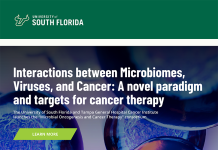Open Access Government produces compelling and informative news, publications, eBooks, and academic research articles for the public and private sector looking at health, diseases & conditions, workplace, research & innovation, digital transformation, government policy, environment, agriculture, energy, transport and more.
Home 2025
Archives
Gut microbiome and aging – Unlocking new frontiers in healthy longevity
As the population ages, research into preserving healthy longevity is gaining pace. Christian Brechot highlights the role of the gut microbiome – a complex community of microorganisms within us – in influencing health as we age.
The microbiome in early life: Setting the stage for optimal early life health in...
Researchers at the University of South Florida Microbiomes Institute are exploring exciting new areas in microbiome research; here, they discuss the essential role that the microbiome plays in early life health.
Interactions between Microbiomes, Viruses, and Cancer
The University of South Florida and Tampa General Hospital Cancer Institute launches the “Microbial Oncogenesis and Cancer Therapy” consortium.
Microbiomes should be incorporated into The One Health Joint Plan of Action
The One Health Joint Plan of Action was created by major international organizations to tackle global health issues related to human, animal, plant, and environmental health. This article emphasizes the importance of integrating microbiomes into this framework to enhance health systems and prevention strategies.
The microbiome and aging: Unlocking new frontiers in healthy longevity
Research conducted by the USF Microbiomes Institute and the MiaGB Consortium is uncovering the significant link between microbial communities and host biology. This understanding could lead to new therapies for age-related conditions. Shalini Jain, Christian Brechot, and Hariom Yadav provide further insights.
The University of South Florida and The Healthy Aging Company
The University of South Florida and The Healthy Aging Company: a highly successful partnership to develop a novel treatment for cognitive disorders and Alzheimer ‘s diseases.
A novel avenue to explore in the treatment of dementia
A collaborative project between the University of South Florida and The Healthy Aging Company is exploring how a new biological entity called ALF5755 could be a candidate drug for the treatment of dementia and Alzheimer’s disease.








